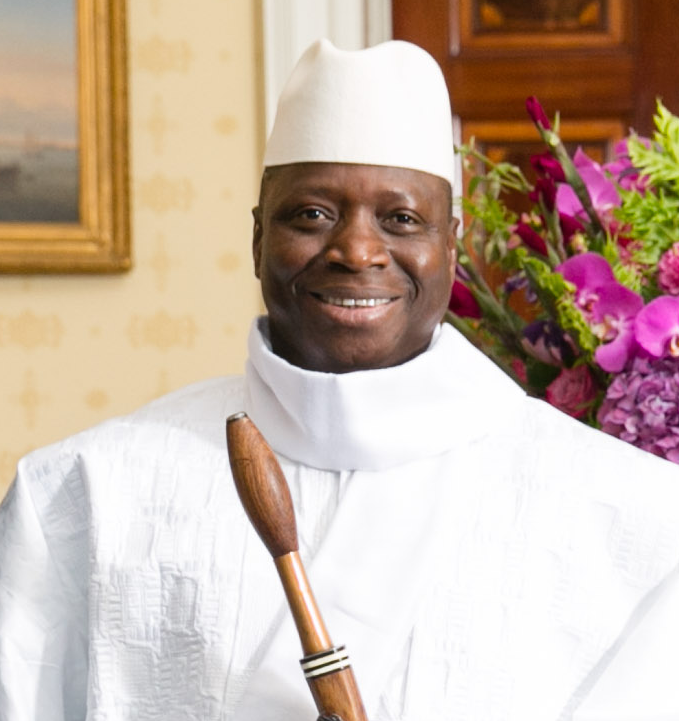Calls for the International Community to Intervene as Gambia Continues to Imprison Dissidents
by Ndesanjo Macha, July 25, 2016.
 |
| Gambian President Yahya Jammeh who has been in power since 1994 is widely accused of human rights violations. |
On July 20, 2016, a Gambian High Court sentenced the leader of the main United Democratic Party (UDP) (currently in opposition), Ousainou Darboe,
and 18 other opposition activists to three years in prison for — among
other charges — participating in a demonstration without a licence. They
were arrested on April 19 in the capital, Banjul.
The opposition has denounced the trial, while human rights organisation Amnesty International has noted that these prison sentences for opposition leaders continue the downward spiral for human rights in The Gambia.
Among those convicted is Fanta Darboe Jawara — a naturalised US
citizen who, while visiting the country, took part in the protest led by
her uncle. The ruling is attracting attention in the United States, where four Maryland congressional members have expressed outrage over her conviction.
In April 2016, the country witnessed a series of unprecendented protests that
started with a peaceful demonstration calling for electoral reforms to
take place prior to the country’s upcoming December 2016 election.
The
demonstration was led by Ebrima Solo Sandeng,
the youth head of the main opposition party, UDP. Many opposition
politicians believe that the existing electoral laws favour the
incumbent president Yahya Jammeh,
and would like to see them changed. As things stand, it is difficult to
challenge him — individuals require as much as 500,000 Gambian Dalasi
(about US$11,280) to register a political party or run as a presidential
candidate in The Gambia.
By the end of the protest, security forces rounded up and
detained Sandeng and other UDP supporters. Sandeng and two other UDP
members died in police custody within 48 hours of their arrests. This led to new demonstrations, led by Darboe, who demanded the release of the remaining protesters.
The United States, the United Nations and other international organisations have repeatedly called
on the government to respect the rights of citizens to peaceful
protest. President Jammeh, who has been in power since 1994, is widely criticised for mistreatment of journalists, opposition members and members of the LGBT community.
In its 2014 submission to the Universal Periodic Review (UPR) of Gambia, Amnesty International noted: “Since
Gambia’s first Universal Periodic Review (UPR) in 2010, the human
rights situation in the country has deteriorated. The government
continues to stifle freedom of expression and commit other human rights
violations with impunity.”
Both Gambians and netizens outside of the country have taken to Facebook and Twitter to condemn the conviction.
Calling for international organisations to intervene, the Media
Foundation of West Africa shared an infographic showing abuses committed
by Jammeh’s government over the years:
Here’s why ECOWAS, AU and the international community need to call President Yahya Jammeh to Order @saineymkmarenah pic.twitter.com/4fyYcDjZPz— Media Foundation-WA (@TheMFWA) July 22, 2016
Niamina Nko also called for the international community to take action:
#GambiaRising #Gambia # shut down all Gambian embassies around the world— Freedom 4 all (@NiaminaNko) July 21, 2016
Oumie Andrews made reference to the fact that the hearing was made before non-Gambian judges:
#GambiaRising #FreeFanta #GambiaStateOfEmergency stop #NigerianMercenaryJudges illegally jailing innocent Gambians pic.twitter.com/3wpzsT8uGw— Oumie Andrews (@OumieAndrews) July 21, 2016
Jammeh’s government has a policy of hiring Nigerian judges and
magistrates; Gambians in the United Kingdom made their views known about
the practice:
#GambiaRising: In UK, Gambians protest, deliver petition at Nigr HC urging halt to #Jammeh use of mercenary judges pic.twitter.com/c0Mx2uABPO— Sanna Camara (@maimuhyai) July 22, 2016
A user using the handle ‘YesWe Can’ lamented:
The sentencing of #LAWYERDARBO and his executives is a travesty… but then all we’re going to do is NOTHING. #GambiaRising #Gambia #Africa— YesWe Can (@YesWeCan_Gambia) July 20, 2016
An online Gambian newspaper seemed to suggest that the judges who
presided over the trial were more concerned with money than anything
else:
#Gambiarising: when money becomes everything to judges, justice becomes the first casualty @NigeriaNewsdesk #Gambia pic.twitter.com/usoinOqlld— Gainako Editor (@dbaldeh) July 21, 2016
On Facebook, a user using the name ‘Che Guevaara’ complained about the hypocrisy of the Africa Union (AU):
The AU does not condemn a Dictator when he is oppressing his people but it will condemn when the Dictator is overthrown.
Commenters from other African countries also weighed in on the situation. Adomati Robert from Uganda pointed out that in African countries in general — not only in The Gambia — opposition parties are not treated fairly:
I’m a Ugandan but I see no difference in political crisis
with that of Gambia and other politically oppressed African nations
where opposition parties are seen as a threat to the political security
of the ruling government. This is a way of defending selfish interests
of the greedy leaders. When the rich robs the poor, it’s called
‘defense’ and when the poor fights back it’s called ‘offense’.
A commenter from Zambia, Eugine Mwambila, said the same treatment of opposition politicians is happening in his country:
african leaders dont want to be opposed,our african
democracy is a sham,Uganda,Egypt,Zimbabwe,Angola and the same is
happening in my country Zambila the opposition is being threatened with
jail terms,there is need for Amnesty and other international Ngo z (sic)
to help this man,
However, Cheikh Bamba came out in defence of President Jammeh, referring to him — with tongue firmly in cheek — as “this dictator”:
This so-called opposition called UDP is a group of
disgruntled figures with ties to the former super corrupt regime and
hardcore tribalists
This dictator out perform the previous 30 years corrupt government and the colonial system combined.
The real farce is the daily fabricated stories regarding the Gambian situation.
FONTE: Global voices


